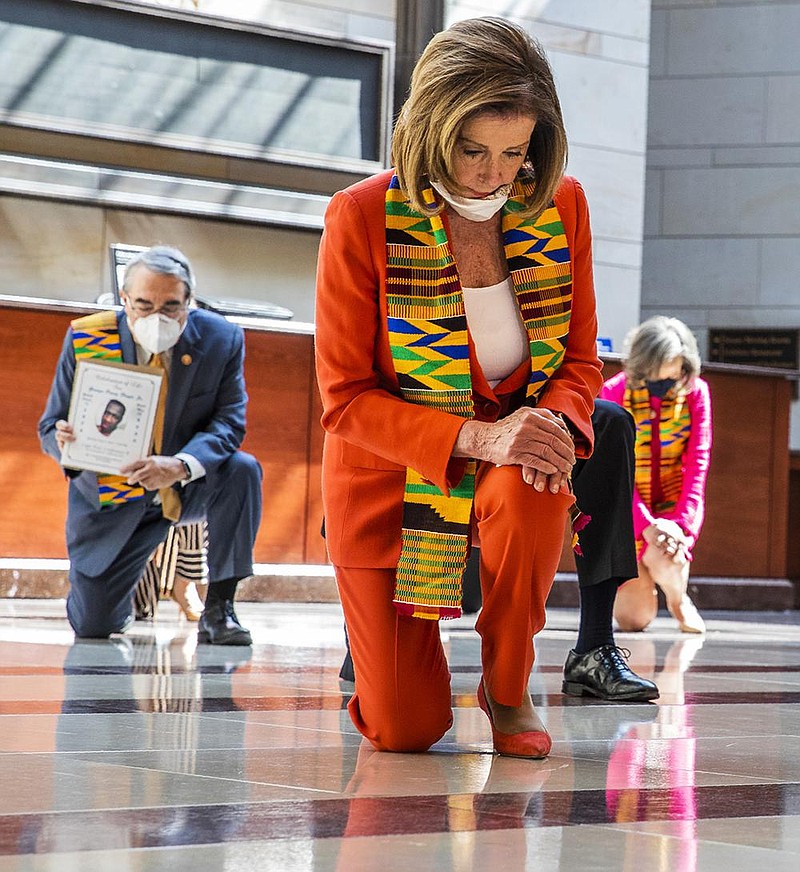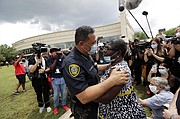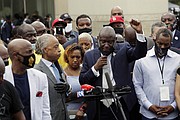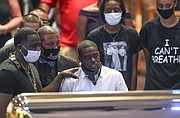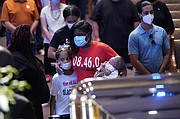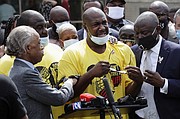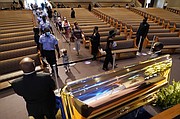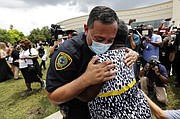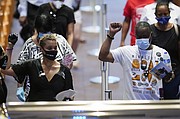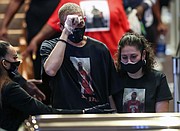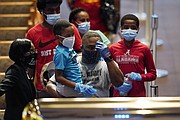MINNEAPOLIS -- Bail of as much as $1.25 million was set Monday for the white Minneapolis police officer charged with murder in the death two weeks ago of George Floyd, a black man who was in police custody.
The hearing was held on the same day that thousands of mourners lined up in Houston to pay respects to Floyd at a public memorial in a church near where he grew up.
Derek Chauvin, a 19-year veteran, participated in his initial hearing at the heavily fortified Hennepin County courthouse on a video feed from jail. Chauvin, who has been behind bars since he was arrested May 29, has been charged with second-degree manslaughter and second-degree murder, a more serious count than he had originally faced. He could be sentenced to up to 40 years in prison.
Chauvin, who placed his knee on the neck of Floyd for nearly nine minutes in a video that led to protests across the nation, has been a focus of anger. Activists said they feared he would not abide by bail restrictions if he were permitted to go home until trial.
Arguing for bail of $1.25 million, prosecutor Matthew Frank said Floyd's death had created "a strong reaction in the community, to put it mildly." He said that created two factors in deciding bail.
"One is the likelihood to flee from the jurisdiction because of not only the severity of the charges, but the strength of the community's opinion," he said. "And secondly, because of the severity of those charges, a significant amount of bail is warranted."
During the hearing, Chauvin wore an orange jumpsuit and a blue mask that muffled his responses of "Yes, your honor" to a few procedural questions. Eric Nelson, Chauvin's lawyer, said he did not object to the state's bail request at this time. Judge Jeannice Reding granted it.
Reding set bail at either $1.25 million without conditions or $1 million with conditions.
Chauvin may be released on $1 million bail if he agrees to have no contact with Floyd's family; to not work in law enforcement or security; and to not possess any firearms, plus surrender any firearm licenses or permits.
His next court appearance is scheduled for June 29, when he will enter a plea and when some of the state's evidence could be laid out.
Chauvin's bail is higher than the bail of at least $750,000 set last week for the three officers accused of aiding and abetting in Floyd's death.
FLOYD REMEMBERED
In Houston, Floyd's body arrived in a gold-colored casket that was escorted to The Fountain of Praise church by police. The six-hour public viewing began Monday afternoon.
Reflecting the weight of the moment, the service drew the families of black victims in other high-profile cases whose names have become seared in America's conversation over race -- among them Eric Garner, Michael Brown, Ahmaud Arbery and Trayvon Martin.
"It just hurts," said Philonise Floyd, George Floyd's brother, sobbing as he ticked off some of their names outside church. "We will get justice. We will get it. We will not let this door close."
Under a blazing Texas sun, mourners wearing T-shirts with Floyd's picture or the words "I Can't Breathe" -- the phrase he said repeatedly while pinned down by Chauvin -- waited for hours to pay their respects as Floyd's body, dressed in a brown suit, lay in an open casket. Some mourners sang "Lean on Me," and Houston's police chief embraced people in line.
Mourners were required to wear masks because of fears of spreading the coronavirus, and they stood 6 feet apart as they paused briefly to view the casket. On a stage behind the casket, two identical murals showed Floyd wearing a black cap that read "Houston," with angel wings drawn behind him.
Republican Texas Gov. Greg Abbott was among the first to view the casket, wearing a striped gold-and-crimson tie, the colors of Floyd's Houston high school, where he was a standout football player.
"George Floyd is going to change the arc of the future of the United States. George Floyd has not died in vain. His life will be a living legacy about the way that America and Texas responds to this tragedy," Abbott said.
Former Vice President Joe Biden met with Floyd's family Monday, according to a photo posted on Twitter by the Rev. Al Sharpton. Biden will provide a video message for Floyd's funeral service. Previous memorials have taken place in Minneapolis and Raeford, N.C., near where Floyd was born.
Floyd's funeral will be today, followed by burial at the Houston Memorial Gardens cemetery in suburban Pearland. He will be laid to rest next to his mother, Larcenia Floyd.
TAKING STEPS
In Washington, House and Senate Democrats held a moment of silence at the Capitol's Emancipation Hall before proposing legislative changes in policing oversight. They also read Floyd's name and those of others killed during police interactions and kneeled for 8 minutes and 46 seconds -- now a symbol of police brutality.
The Justice in Policing Act would limit legal protections for police and create a national database of excessive-force incidents, according to an early draft. The legislation would also ban the use of chokeholds by police.
Meanwhile, officials nationwide are already taking steps to outlaw chokeholds: California Gov. Gavin Newsom ordered the state's police training program to stop teaching them, and Denver police announced Sunday that they were banning them, effective immediately.
In Paris, France's top security official said police would no longer permit chokeholds that have been blamed for multiple cases of asphyxiation and have come under renewed criticism after Floyd's death.
Floyd's death has spurred calls for change nationwide:
• The Minneapolis City Council has vowed to dismantle the city's 800-member police agency.
• Black Democrats in the Pennsylvania House of Representatives commandeered the podium for about 90 minutes at the start of a voting session Monday, disrupting the day's business in an effort to force action on police reform bills.
• Washington Gov. Jay Inslee said he was convening an advisory group of black leaders and law enforcement representatives to develop police reform proposals.
He stated three areas of action: having an independent investigative and prosecutorial process for allegations of officer-involved killings, which would involve the creation of a state investigative unit separate from any other law enforcement entity in the state; rethinking police use of force, including chokeholds; and creating a legally binding and enforceable obligation that officers report misconduct by colleagues.
• Nashville, Tenn., will begin rolling out body cameras and in-car cameras for much of its police force next month, Mayor John Cooper said in a statement Monday. The project has been repeatedly delayed over concerns about cost.
Cities imposed curfews as several protests last week were marred by spasms of arson, assaults and smash-and-grab raids on businesses. More than 10,000 people have been arrested around the country, according to reports tracked by The Associated Press.
But protests in recent days have been overwhelmingly peaceful -- and over the weekend, several police departments appeared to retreat from aggressive tactics.
Prosecutors said criminal charges will not be brought against thousands of Los Angeles protesters arrested for violating curfew and other police orders.
City Attorney Mike Feuer said Monday that his office will develop an alternative outside court without punishment for those cited for violating curfew or failing to obey orders to leave demonstrations.
District Attorney Jackie Lacey said she won't file charges in protest misdemeanor cases from other parts of Los Angeles County.
Several cities have lifted curfews, including Chicago and New York City, where Gov. Andrew Cuomo urged protesters to get tested for the coronavirus as concerns have been raised that demonstrations could lead to an increase in virus cases.
In Portland, Ore., the police chief resigned Monday, just six months into her job, amid criticism of her department's handling of protests in Oregon's largest city. A black lieutenant on the force replaced her. The shakeup came as police have been sharply criticized for using what has been called inappropriate force against some protesters as huge demonstrations continue in Portland.
LETTER TO TRUMP
Also on Monday, House Speaker Nancy Pelosi, D-Calif., and Senate Minority Leader Charles Schumer, D-N.Y., called on President Donald Trump to reopen Lafayette Square, a week after authorities pushed back largely peaceful protesters by charging at them with mounted police and firing canisters that sent plumes of noxious smoke into the crowd.
In a letter to Trump, the two Democratic leaders emphasized that the square "has long been a venue where Americans can gather to freely exercise their constitutional rights in close proximity to the White House."
"You have now erected heavy, semi-permanent steel fencing to wall off the Square," Pelosi and Schumer wrote. "Your conversion of this unique public park in the heart of our Nation's capital to what looks like a militarized zone denies citizens access to the park and sends the worst possible message to the American public and people around the world."
They added, "Lafayette Square should be a symbol of freedom and openness, not a place behind which the leader of our Executive Branch cowers in fear of protesters who are crying out for justice."
On June 1, police aggressively cleared a crowd of largely peaceful demonstrators from the square, which is across from the White House.
In the past week, the barriers encircling the White House have expanded, with more than a mile of tall metal fencing now surrounding the executive mansion. The Secret Service told CNN that the additional fencing will remain up until Wednesday.
Pelosi and Schumer said in their letter Monday that the Trump administration's explanation that the square should be closed for security reasons is "not sufficient," noting that the usual measures "have for a quarter of a century been adequate to protect the White House complex from terrorism and all manner of other threats."
"It is simply not credible to claim that the current protests justify the oppressive walls you have erected in response," they wrote. "We therefore urge you to tear down these walls, reopen Lafayette Square, and allow the public to gather there for you and all the world to hear their voices."
Information for this article was contributed by Juan A. Lozano, Nomaan Merchant, Paul J. Weber, Sylvie Corbet and staff members of The Associated Press; by Kim Barker and Matt Furber of the The New York Times; and by Felicia Sonmez of The Washington Post.

